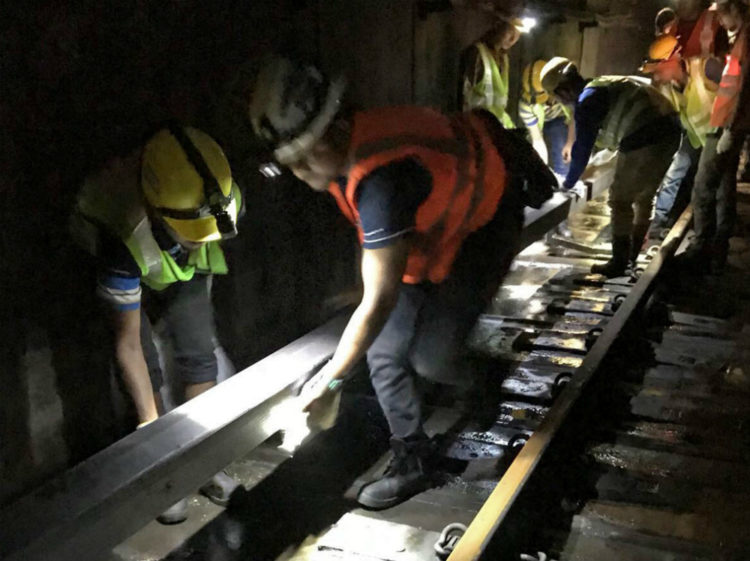
Last month’s heavy flooding in MRT tunnels had emergency responders from the Singapore Civil Defence Force working with teams from PUB, SMRT and the Land Transport Authority to pump out water from the affected areas.
WHY IS THE MAINTENANCE CULTURE STILL FLAWED?
In December 2011, the North-South Line was hit by two massive breakdowns in swift succession.
The severity of those disruptions – the worst the MRT network had seen at the time – prompted the Government to call a high-level COI.
Then SMRT chief executive Saw Phaik Hwa drew flak for focusing on growing the transport operator’s retail business, instead of engineering. She resigned in January 2012.
After a six-week inquiry, the COI concluded that SMRT’s inadequate maintenance had led to the December disruptions, and flagged shortcomings in its maintenance and monitoring regime.
Since then, SMRT has moved to prioritise maintenance, and embarked on an overhaul of key systems on the ageing North-South and East-West lines that will take up till 2019 to be completed.
It employed former chief of defence force Desmond Kuek as its new CEO in October 2012.
In an interview with this newspaper soon after some of the company’s bus drivers from China went on an illegal strike in November 2012, Mr Kuek said: “There are clearly managerial, structural, cultural and systemic issues that need addressing.”
SMRT has been grappling with the issue of poor work ethic among some staff for years, says the former SMRT senior executive who spoke to Insight. He cited the security breach at Bishan Depot in 2011, which saw vandals break into the facility and spray-paint graffiti on a train. Staff responsible for checking the train’s exterior failed to detect the graffiti before it left the depot.
Insight also spoke to another former SMRT executive, a top-ranking one, who asked not to be named.
He recounts an instance when staff were sacked for failing to grind the train wheels when they were supposed to.
After taking the helm, Mr Kuek moved to transform the company.
He brought in new management, both from the military and the private sector.
Former military men in key posts include SMRT Trains chief Lee Ling Wee, who was head of air engineering and logistics at the Republic of Singapore Air Force, and chief corporate officer Gerard Koh, a colonel in the Singapore Armed Forces (SAF).
SMRT adopted six core values, including service excellence, responsibility and integrity.
The transport operator also appointed a technical advisory panel and hired more engineers and technicians. It says it has beefed up its team of engineers by more than 150 percent in the last four years, and aims to increase the ranks by another 40 percent by 2020.
A maintenance operations centre was set up in 2015, to improve its response to disruptions as well as overall maintenance.
Last year, SMRT was privatised to allow it to focus on becoming a commuter-centric transport operator.
Despite these changes, the severity of disruptions has worsened and staff lapses have persisted.
At a press conference last month, after the flooding incident, Mr Kuek said: “Much progress has been made with the inculcation of a positive work culture in the workforce, but there remain some deep-seated cultural issues within the company that has needed more time than anticipated to root out.”
He stressed, however, that nine in 10 of SMRT’s staff are “incredibly committed, professional and commuter-focused”.
So why has the operator been unable to change the cultural mindset of all staff after five years under Mr Kuek’s leadership?
The former SMRT senior executive points to cultural differences between the SAF and SMRT.
“You cannot get somebody from Amazon to go over to Google, and change the culture to Amazon’s culture,” he says. “So it is a big challenge for them.”
He also conceded that the senior management during his time did not fix gaps in SMRT’s system that allowed workers to get away with lapses.
SMRT has improved its protocols because of its leaders’ military background, he notes – adding, however, that the company also needs people with deep knowledge of the rail system to avoid “group-think”.
Agreeing, the former top-ranking SMRT executive also cites the loss of staff with institutional knowledge of rail as a factor behind the operator’s reliability woes.
The new management lacks the experience to spot and address systemic weaknesses, he says.
NUS’ Professor Lee says SMRT has put in a lot of effort to address engineering issues in the past few years, but may have lost sight of management issues.
MP Zaqy Mohamad, a Transport GPC member, calls on SMRT to understand the rationale behind its workers’ actions.
He says: “It’s easy to point to culture, but they have to relook the root cause of how this came about.”
The current SMRT staff member who spoke to Insight says top management is taking the issue very seriously, and adds that many systems have improved under its watch. “But it’s always this last thing that we didn’t think of that comes back to bite us.”












